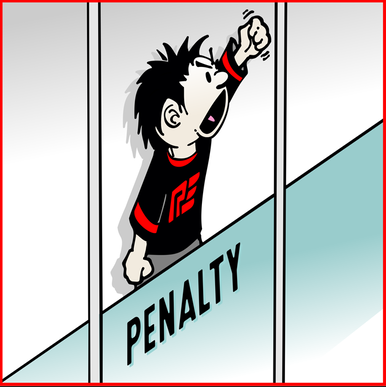They are an important part of every athlete's make up.
Emotions are both good and bad but they are controllable by you.
Great athletes use Emotions as motivation to improve, whether it be skating, fitness or your shot, improving your skill means improving one's self. Improvement does not come easy, it requires work, which pushes one out of their comfort zone. Pushing your effort out of your comfort zone puts you in an uncomfortable position. We at times get complacent, we are happy when we make a team, are on the second line, are a top 4 D man pairing, Great athletes aren't satisfied with that, they challenge themselves to improve, they strive for being the best and they work to become the first line player or the top D man pairing or the starting goalie.
Failing to manage your emotions can and will lead you nowhere. Allowing them to control you will lead to reckless play, playing out of position, not allowing you to focus on your responsibilities, that will lead you to lose your Coaches trust, your teammates may think you to be selfish and most importantly it shows a lack of maturity that is unacceptable in a team sport.
Proper emotional management though allows you to stay the course, see the big picture of what you and the team are trying to accomplish and focus on acting and not reacting to situational things happening in the game.
Emotions are both good and bad but they are controllable by you.
Great athletes use Emotions as motivation to improve, whether it be skating, fitness or your shot, improving your skill means improving one's self. Improvement does not come easy, it requires work, which pushes one out of their comfort zone. Pushing your effort out of your comfort zone puts you in an uncomfortable position. We at times get complacent, we are happy when we make a team, are on the second line, are a top 4 D man pairing, Great athletes aren't satisfied with that, they challenge themselves to improve, they strive for being the best and they work to become the first line player or the top D man pairing or the starting goalie.
Failing to manage your emotions can and will lead you nowhere. Allowing them to control you will lead to reckless play, playing out of position, not allowing you to focus on your responsibilities, that will lead you to lose your Coaches trust, your teammates may think you to be selfish and most importantly it shows a lack of maturity that is unacceptable in a team sport.
Proper emotional management though allows you to stay the course, see the big picture of what you and the team are trying to accomplish and focus on acting and not reacting to situational things happening in the game.
Ask Yourself 2 Important Questions:
- Do my emotions make me apologize for my actions?
- Do I look for instant revenge when I feel a call has been missed on me or an opponent has gotten the best of me?
When you are in control of your Emotions you will turn them into Goals both on and off the ice.
Sincerely, Coach Vaughan Rody
Sincerely, Coach Vaughan Rody


 RSS Feed
RSS Feed
